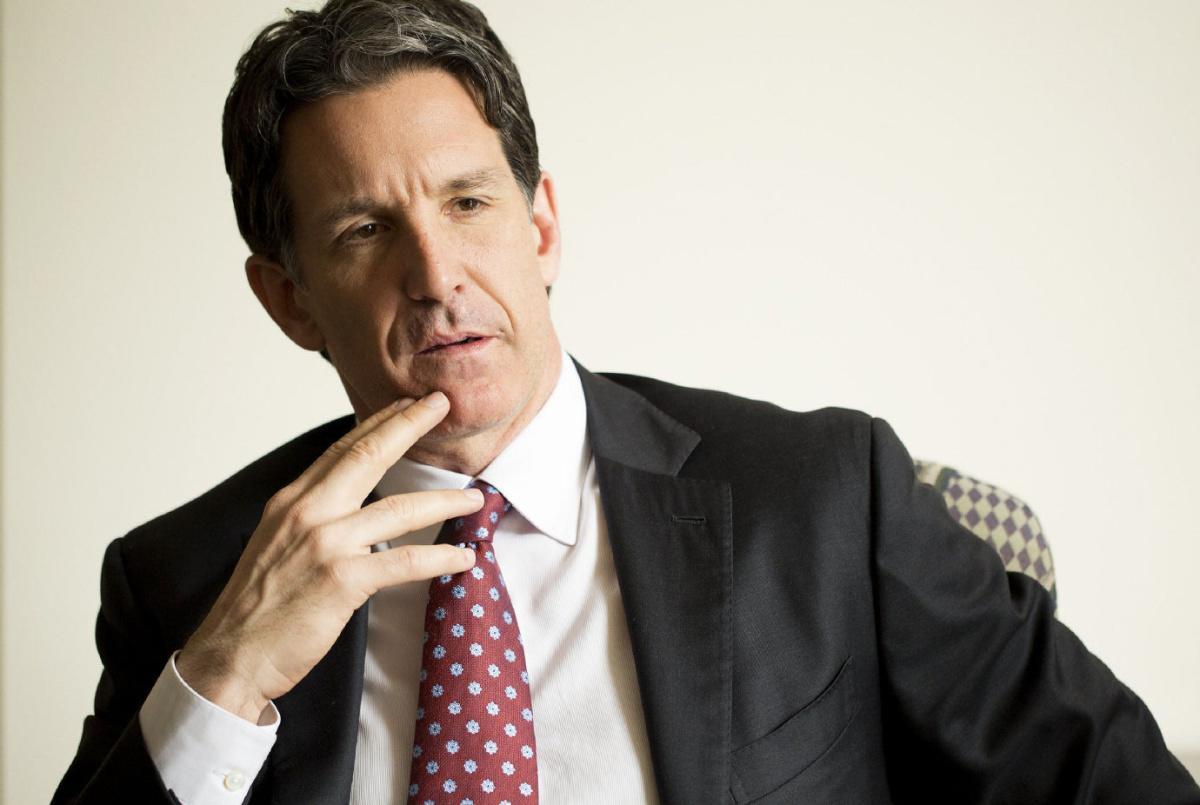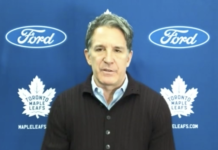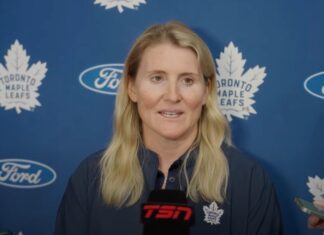Brendan Shanahan joined Prime Time Sports on Tuesday evening to discuss the progress made to date, the next stage of the team’s evolution, Lou Lamoriello’s future, fitting the core under the future cap, and more.
This is the first year you really get a chance to kind of feel what you done. Last year maybe wasn’t shocking to you, but pleasantly surprising. Now you think you’ve got something.
Shanahan: Last year, what was a little bit shocking to us was when all of these young players came to camp. You have hopes that they’re all going to be good. We saw them a little bit; if you remember two years ago, they all got little cameos with the Maple Leafs and then we put them back with the Marlies for the playoffs. We liked what we saw, but you don’t necessarily know if that’s going to translate after another summer. You don’t know how good Marner is going to be coming from junior. At the time, we didn’t know we were picking first overall. You’ve got all of these young players coming in. You hope they’re going to be good — you think they’re going to be good — but realistically, you’re not thinking you’re going to have eight or nine rookies making big impacts. They all did. They all came in and lived up to their promise. It was a fun year for them. Early in training camp, internally, we started to think there was a chance these guys might sneak up on some people.
There was so much going on in the city at this time last year – Grey Cup, World Cup of Hockey, the Blue Jays – and Auston Matthews wasn’t even with your team. It really, at the time, kind of allowed you to have a camp – your coach wasn’t even with you for most of it – and sort of go under the radar a little bit, which is very much different this Fall.
Shanahan: Yeah. You know what, though? If you’re in this business to become a good team – if you’re in sports, you should be in the business to have a good team – at some point you’re going to have pressure and expectations. When you look at some of the players we have in this organization, it’s not like pressure or expectations are suddenly something where they’re going to say, “Oh, wow, what is this?” They also seem, to me, to be recognizing early in their careers that the more they lean on each other — the more they come at you as a pack — the safer they’ll all be. Whether it’s success or failure, you do it as a team. That’s something I give a lot of credit to Lou Lamoriello and Mike Babcock for – for instilling that culture in them.
In terms of the media, or the public in general, or just everything that comes with Toronto?
Shanahan: I think these players enjoy it. They’ve come in here and sort of ignored things that were said in the past. They don’t want to play anywhere else, it appears to me. They like it here. They like what they’ve built as a reputation. They like the relationship they’ve built with their fans. They enjoy how their fans see them. Even the players that were here in some of the more difficult years, in talking to some of them, they just can feel the change that has occurred. This can be a fun city to play in. We’ve said it before we had all of these new players here: Some players don’t want to play in an environment like this. That’s fine. They can go play somewhere else and have success. But there are a lot of players that do want to play in a market where the games mean a lot to the city.
As a former player, did you go through a sophomore slump? Did you find year two tougher?
Shanahan: I was so bad my first year that I couldn’t have gotten worse my second year. There were no expectations.
Do you believe in the theory of the sophomore slump?
Shanahan: I guess. I don’t know. I guess the way I’m answering it: Not really. I think that one thing we’ve talked about – at the end of last season, you heard some of our players say this – is how we’re not going to sneak up on anybody anymore. But to see the work that they’ve put in… again, I’ll go back to the leadership that they have with their GM and their coach right now, preparing them at the end of last season for it being that much tougher next season. If we’re going to keep taking steps, nobody could really spend time going back this summer and listening to how happy everyone is. They had to put the work in. We’re very confident our players put the work in.
One of the narratives we heard is that high-profile free agents don’t want to come to Toronto because there are too many expectations, and you got one in Patrick Marleau. If there was a surprise, it was – after so many years, in a very quiet market in San Jose – that he chose to go to the noisiest market. When you guys went out and pursued him, did you think that he was the kind of guy who would say, “Yeah, I want to be in Toronto.”
Shanahan: You never know. It’s the job of Lou to put that question out and see what kind of an answer you get. He got a favourable answer and it sort of grew from there. Over the course of a few days, Lou was able to get it done. I think it excited our players. When I say our young players, they’re all younger than Patrick. It excited our veteran guys. Nazem, Morgan, Jake — it excited them as well that a player of his calibre would choose Toronto and say, “I want to come be a part of this.” And I give the players the credit. It doesn’t matter at this point what I say or even Lou says. The biggest influence that we have and the biggest attraction we have to other players are the players in the dressing room and on the ice. They did a great job last year. They put the work in. They looked like they were enjoying it. I think that’s how you start to change the perception.
You talked about Lou Lamoriello being the architect of the acquisition of Marleau. Were you involved at all in the Marleau signing?
Shanahan: I think, in this day and age in hockey, everyone is involved in a cap world. Brandon Pridham is involved. Lou is involved. Mike – of course, you’ve got to make sure the coach is on board. Mark Hunter, Kyle Dubas. Lou has done a really good job, and I think that’s just the reality of modern sports now: When you like a player or you have a certain situation, you might be the driver or the architect of the deal, but you check all the boxes. You check to see the prospects that we have coming down the pipe. You check to see their timeline of arrival. You talk to the capologist and you start thinking about signing our players two or three years down the road. If all the boxes check, you go forward and you try to make the deal. Whereas 15-20 years ago, if you like the player, you go get the player.
Were you part of the pitch?
Shanahan: I wasn’t part of the pitch, but I do have a relationship with Pat. At one point, when Lou was having a conversation with him, I was in the room. The way it works at the time is we’ve got sort of everybody all hands on deck. We’re all sort of in and out of the room. In talking to Patrick afterwards, I think that Mike Babcock was a real motivating force for him to come here. He’s had a lot of success with him at the Olympics. Mike was very enthusiastic about what he thought would be a real good role for Patrick. More than anything, there was the comfort with Mike and then just the young players and the direction of the team.
Every year is important, but is this kind of where Mike Babcock has really got to start coaching this team because there are so many other things going on [and higher expectations]?
Shanahan: It’s funny. I agree with you in that we’ll say it all this year — and then we’ll say it all again next year. I remember when we won a Cup in Detroit, that summer we were all saying, “Next year is such a big year for us because we have to prove something different.” It doesn’t matter if you’ve had failure or successes. The year that you stop saying, “This is a big year,” or, “This is the year that I prove myself,” is probably the year when you really should step aside and not do the job anymore. This is a huge year for Mike. I’m not lying to you when I say they’re all going to be.
It does change from when it’s all young guys and they’ve got bigger contracts and higher expectations now. Is that part of the reason why you brought in a Marleau, a Ron Hainsey, a Dominic Moore? Some older guys to make sure this stays in the direction you want it to go in?
Shanahan: That is definitely something where especially Lou has such a deep respect and value for having veterans in the room. No, you’re right – it is something that we talked to the players about before they took off for the summer. Mike is the kind of guy — regardless of whether we win or lose night before — who shakes the night before off and shows up the next morning with this sort of brand new attitude that today is the most important day in your life. That is really an amazing gift he has as a coach.
Was he always that way, even when he coached you?
Shanahan: He really was. He didn’t hold things. He didn’t carry things for days. I’ve had other coaches and seen other coaches where they sort of can’t get over an issue or a game or a giveaway or a bad loss, and it drags on for a while. One of the more impressive things with Mike is his ability the next day to come in and look each guy in the eyes and say their names — say good morning — regardless of who was a plus and who was a minus the night before.
Lou Lamoriello is entering his third year under his agreement. There was some speculation during the course of the summer that there would be a renewal announcement. Where are you at with Lou and his longer-term viability in the role he is in?
Shanahan: If you know Lou, and you know that I’ve probably learned a little something under Lou, those are the kind of things… we focus on our job. We focus on the job that we do that day. The rest of it usually takes care of itself. I know I’m going to be asked that question this year and I’m just going to be focused on the present as well. The rest of it, we really don’t think it’s something we comment on publicly.
You would understand that, as much respect as we have for Lou, he is not a spring chicken anymore. There comes a point in your life where you start thinking, “I like doing this, but maybe there are other things I’d like to do.” Do you have any sense as to whether he’s thinking about retirement and contemplating that, or is he just full bore? Is he more likely to stay for five years than just the rest of the season?
Shanahan: Like I said, I won’t say one way or the other. I just know that I saw Lou today and he had a ton of energy. He’s ready for this season. He was working hard all this summer. This is an incredible man who just doesn’t slow down. He really is a medical marvel when you think about some of the guys that I will bump into – peers and friends around the league – and know it can be a draining job to be a GM of a team. They still shake their head at him and the amount of work he does and puts into it.
Year 2 after making the playoffs becomes a bit harder, doesn’t it? You can’t sit here and say, “We’re ready to win a Stanley Cup.” You may hope that, but you can’t say that. What is the goal? Are you big on putting that dart board out there and saying, “Hit the bulls eye.”
Shanahan: It’s a hard question to answer. In one sense, you don’t ever want to put a ceiling on what your goals are. At the same time, you don’t want to overstate things. You also don’t want to announce what you’re thinking. Certainly, last year we felt – especially as the season was going on and the players were responding and we were getting contributions from a very deep lineup – we started to realize that we really felt we could be a playoff team and a dangerous team in the playoffs. Now, as much as we played well, we kept things in perspective. We lost in the first round of the playoffs. We made the playoffs in game #81. We’re not running around doing any victory laps in our offices, and neither are our players. Certainly, we don’t want to take a step backwards. Our players will be the first ones to say that they enjoyed the taste of the playoffs last year. We want to grow on that.
Is it okay to talk about Stanley Cups now? Is it okay to say, “That’s what we are trying to do?” In this town, it’s difficult. Are those words that you can’t say yet because this team is so young, or can you?
Shanahan: Even before we had a collection of the talent that we have, we’ve stated for the last several years that we want to build a team that is capable of contending for the Stanley Cup over a long period of time. That is our goal. The answer is no. I think you have to say the Stanley Cup… even when you’re in the infancy of your building, you need to constantly have reminders and photos and pictures of old glory years where guys were hoisting it. I’m a big believer that it’s not a bad word or a secret you can’t talk about. This is why we are in the business. This is why I came to Toronto. This is why Lou came to Toronto. It’s why the players want to be in Toronto. It’s why players are in all of these other cities, and why we’ve got these competing GMs coming up against us. This is the business that we’re in. We’re all building toward making a team that is capable of winning a Stanley Cup.
Without naming names or pointing fingers or telling absolute stories, are you starting to sense yourself that there is a greater interest among players in playing for the Toronto Maple Leafs than two years ago?
Shanahan: I’ll tell you a story I told someone earlier today. A couple of years back, we were in the running for a free agent. I was driving my son to school and he was 12 at the time. I said, “He chose another team over us.” This was one of the top teams in the NHL. My son – 12 year olds can sometimes be so blunt – said, “Well, do you blame him?” We didn’t, at the time, have Mike Babcock or Lou Lamoriello. We ourselves were in our infancy stage. The answer is yes, having good players and having a better environment certainly makes it a safer, more attractive place for other players.
Can you put your finger on a need or a want right now?
Shanahan: It’s funny when I hear stuff like this. We all want to get better. We can spend a whole lot of time looking around the league at other players and waiting for that one big trade, or I’ll sometimes hear the different trade options that are going through the media. When teams have good players, they don’t want to give them up. We’ve got some good players. We don’t want to give them up. I don’t know why another team would just sort of say, “We’ve got this fantastic defenceman or centerman, would you like to have him?” unless we have to give up something we don’t want to give up. I think you’re always sort of on the look out for potential deals.
At the same time, Lou and Mike and our entire staff — when I say the entire staff, I mean our sports science department, our trainers, Kyle Dubas and Sheldon Keefe with the Marlies – have done a really good job of concentrating and focusing on what we do have and making sure that they are going to be the best possible players they can be. The development aspect of this is so incredibly important so that the current players improve, so that the players you’ve drafted who are back in junior or with the Marlies are really, hopefully, potentially going to be Leafs one day. And then you don’t have to go out and hope and wait for help from another team.
There is going to be cap pressure with your ‘Big Three.’ We’ve seen it with other teams not being able to keep your guys. Can you tell Leafs fans right now that you can keep these three players, pay them, keep them on this team, and stay competitive?
Shanahan: We believe so and we hope so, but you never know until you get there. This is where Brandon Pridham does such a great job. He does a great job making sure we don’t get caught by surprise. We understand those challenges. It’s our coaches’ job to worry about today.
You were also saying you have a capologist and you’re looking at players and slotting them two or three years from…
Shanahan: It’s management’s job, on the other hand, to be thinking two, three, five years down the road. Those are some of the conversations that go on when you’re making decisions on the team.
Do you get concerned when you see contracts like McDavid’s? We all know he’s a very, very talented player, but it’s a big number. We all know that agents and players use – as their points of leverage – that, “My guy is as good as that guy, and that guy got this, so my guy wants that.”
Shanahan: Rather than work on hypotheticals, we try to control what we can control, which is: We want this to be the kind of place where players want to stay and have an era of hockey together.
Do you think you can do that?
Shanahan: I hope so.
You’re hoping you can create a culture here where guys, theoretically, will take a little less to stay as Maple Leafs?
Shanahan: I don’t know how it has to play out, but certainly, we hope that all of our decisions and personnel decisions are based on how we build our best team. As far as going down the road of hypotheticals, I learned during my other job doing suspensions that you could do this all day if you start. You wonder about these things yourself and you internalize, but they’re not things that are really fruitful or productive to talk about out loud.
With Timothy Liljegren, there seems to be a sneaking suspicion that maybe you did pretty well by getting him where you got him because he is a kid who got sick last year. Does he have a chance to be a Toronto Maple Leaf this year?
Shanahan: We have camp in a few days and it’s not for me, the President of the team, to decide who has a chance and who doesn’t. That’s the great part about training camp. All of these kids are preparing. Let them tell us. I will say that it is a nice problem to have right now that we have a lot of good players and they don’t want to give up their job. It becomes harder to crack this lineup when you’ve got a bunch of players that say, “No, I want to earn this living and I want to be here.” One of the things that we’ve really tried to focus on is making sure that if players aren’t here with the Leafs and are somewhere in our system – whether they’re playing with the Marlies or somewhere else and we’re sending our development staff to see them – we want to make sure that when they’re ready, they’re ready to step in and play for Mike.
Do you think you might have gotten a little lucky with him, getting him a little lower than he maybe should’ve been?
Shanahan: We were very happy that he was there. Obviously, he is a defenceman. He is a right-handed defenceman. He plays a puck-moving game. He is beginning the odyssey of all the work that has to go into becoming an NHL defenceman. It is a lot of work to do.




































